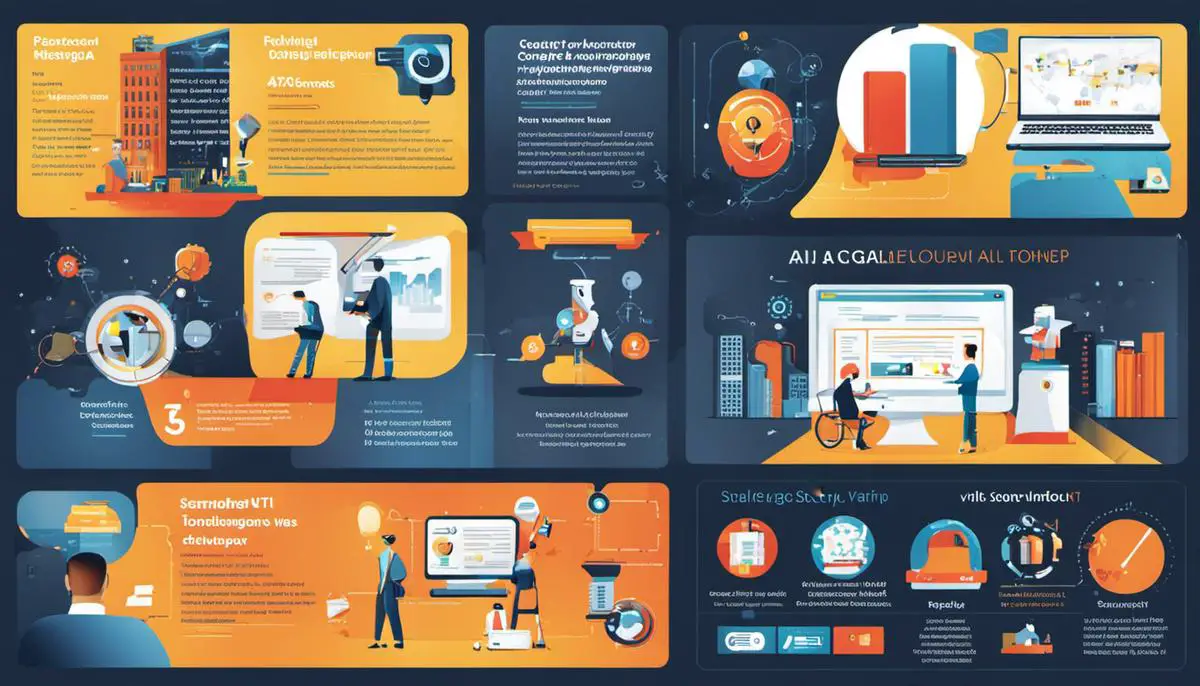The dynamic world of startups thrives on cutting-edge technology, ceaselessly creating new business models and defying traditional paradigms. As we witness an increasingly digital era, understanding startup technologies becomes essential not only for the tech-savvy but also for ambitious young entrepreneurs ready to make their mark on the world. This exploration navigates the vast maze of startup technologies, categorizing them according to their role in operational efficiency and development, and gains insights on the latest tech trends shaping the startup landscape. Knowledge of startup technologies culminates in the mastering of implementation strategies that ensure seamless integration into any business setting.
Understanding Startup Technologies
Definition and Importance of Startup Technologies
Startup technologies refer to the digital tools, technological platforms, and software utilized by companies in their early stages or “startup” phase to manage operations, increase efficiency, and drive growth. In today’s digital age, the adoption of these technologies has become essential as they serve multiple purposes which can bolster a startup’s competitive advantage.
Influence of Technology on Startup Culture
In recent years, technology has reshaped the startup culture to a drastic extent. Rapid advancements have allowed entrepreneurs to launch businesses more easily, with lower initial costs and faster turnaround time. A tech-forward culture encourages collaboration, innovation, and agility – key elements for a startup to thrive.
The implementation of latest technologies like AI, IoT or blockchain is no longer an exception, but the norm. These technologies allow for improved data analytics, customer insights, efficient product development and so much more, thereby enabling startups to make precise data-driven decisions. Additionally, communication and project management tools have revolutionized work dynamics, fostering an open and responsive work environment.
Role of Startup Technologies in Growth and Development
Startup technologies play a critical role in business growth and development. As startups are usually characterized by limited resources, incorporating technology can amplify their productivity by automizing operational processes, cutting down manual tasks and reducing chances of human error.
Using digital platforms for sales, marketing, and customer service can enable startups to expand their reach and attract a larger customer base. On the customer side, technology helps enhance the user experience, making the product or service more appealing, thereby driving customer loyalty and trust.
Cloud-based tools and software are particularly beneficial for startups as they provide affordable and scalable options that grow with the company. These tools often offer pay-as-you-go models which allows startups to select options appropriate for their size and scale.
Common Startup Technologies
There is a vast array of startup technologies available, each catering to different needs of a business. For customer relationship management (CRM), platforms like Salesforce and HubSpot are popular. For project management, startups often turn to tools like Asana, Trello or Slack. Cloud-based platforms like Amazon Web Services (AWS) and Microsoft Azure are commonly used for data storage and management, while Google Analytics and Tableau are leveraged for data analysis.
Coding technologies consist of Python, HTML5, and JavaScript for backend development while AngularJS and ReactJS are generally used for frontend tasks. In terms of Artificial Intelligence and Machine learning, TensorFlow and PyTorch are examples of popular platforms.
Ultimately, startup technologies form the basis of today’s businesses, playing a key role in their expansion, effectiveness, and competitive edge. For startups looking to thrive in today’s digital age, it’s essential to embrace these revolutionary technologies.

Exploring Types of Startup Technologies
The Importance of Startup Technologies: Scheduling and Communication Tools
Navigating the landscape of startup technologies, scheduling and communication tools such as Slack, Asana, and Trello prove to be of great significance. These platforms are specifically engineered to make workflow more efficient, foster teamwork, promote transparency, and keep team members liable for their respective tasks. Slack stands out as a potent communication tool, offering real-time messaging, file transfer, and voice/video calls, thus becoming an integral tool for teams operating remotely. In contrast, Trello is a project management platform featuring a unique card-based system for task allocation and tracking, which facilitates organized and efficient management. Asana, similar to Trello, assists in task management but provides additional features like project timelines, reports, and task dependencies.
The Role of CRM Software in Startups
Customer Relationship Management (CRM) software, such as Salesforce, Hubspot, or Zoho, is another fundamental technology for startups. These platforms allow businesses to manage and analyze customer interactions and data, with the goal of improving customer satisfaction, increasing sales, and fostering customer retention. Salesforce stands out as a market leader offering versatile features for sales management, marketing automation, partner relationship management and customer service. Hubspot, while also a CRM platform, places a stronger focus on inbound marketing, sales, and service software. Zoho CRM, renowned for its affordability, provides a comprehensive set of features suitable for small to medium-sized startups.
Data Analytics Platforms
Data analytics platforms, such as Google Analytics, Looker, or Tableau are crucial in today’s data-driven business landscape. Google Analytics, a free tool offered by Google, provides startups with valuable insight into website traffic and user behavior. This information can guide business strategy and optimize the user experience. Looker is an in-depth analytical tool, integrating with various databases and allowing startups to generate flexible and comprehensive data reports. Tableau, on the other hand, specializes in data visualization, assisting startups in understanding and presenting their data in a more graphical and organized manner.
Technological Impact on Business Operations
Each listed technology has a significant impact on business operations, all aiming to improve productivity and efficiency. Scheduling and communication tools foster a collaborative environment, streamline tasks, and improve punctuality. CRM software, by consolidating customer data, optimizes sales strategy and improves customer relations. Lastly, data analytics tools guide strategic decision-making through insightful data interpretation.
Understanding the Role of Technology in Startups
The rapidly evolving world of startup technologies is transforming the way business is being conducted, especially within the startup scene. As these emerging companies adapt to digital platforms and algorithms, the role of technology in enhancing operations, boosting productivity, and gaining competitive edge becomes even more crucial. Startups are utilizing technology to optimize resources and streamline processes that are integral to their success – including strategic planning, communication, customer relationship management, and data analytics. The need to stay ahead of the curve is creating a dynamic landscape, continually reshaped by new and innovative technologies.

Latest Trends in Startup Technologies
The Impact of Artificial Intelligence on Startups
In the list of breakthrough startup technologies, Artificial Intelligence (AI) stands out, offering tools and techniques that are fundamentally altering business operations. Use of AI in startups is increasingly prevalent and with good reason. Not only does AI bring efficiency to operations by automating tasks, it also significantly optimizes resources. AI-powered chatbots are being used extensively in customer service, providing round-the-clock support and handling customer queries. However, the true potential of AI lies in its ability to analyze vast amounts of data to generate insights and inform decision-making processes. Given its adaptive nature, AI is continually learning and improving – characteristics that give startups the edge they need to grow and scale in a competitive environment.
The Cloud Computing Revolution
Cloud computing is another transformative startup technology that is dominating the startup scene. This technology eliminates the need for physical servers, reducing overhead costs significantly and promoting scalability. Startups are leveraging cloud technology for a myriad of applications such as data storage, app development, and software deployment. It also facilitates remote work, which is particularly relevant in the current pandemic-induced work-from-home culture. With the umbrella of services that cloud computing provides, such as Infrastructure as a Service (IaaS), Platform as a Service (PaaS), and Software as a Service (SaaS), startups have the flexibility to choose what fits their needs best.
Platform Integration and Startups
The integration of multiple platforms has shown to be a game-changer for startups as it allows them to streamline processes and improve productivity. By consolidating various functions, like email marketing, customer relationship management, and project management onto a single platform, startups can eliminate redundancies and improve workflow. Startups are using sophisticated software like Zapier and Integromat to connect their web apps and automate workflows.
Emerging Technologies and their Relevance to Startups
Emerging technologies like Augmented Reality (AR), Virtual Reality (VR), and IoT (Internet of Things) are also proving to have massive potential within the startup scene. AR and VR technologies are offering startups new ways to engage their customers, providing immersive experiences that are far more engaging than standard 2D interfaces. Startups are also utilizing IoT technology for advanced analytics, real-time monitoring, and automation of tasks. These technologies provide startups with significant opportunities to differentiate themselves from their competitors and disrupt conventional business models.
Blockchain Technology and Startups
Blockchain technology, while often associated only with cryptocurrencies, has a wide variety of applications for startups. This technology gives startups the capacity to create decentralized networks, enhancing transparency and security. Startups in industries such as finance, logistics, healthcare, and supply chain management are leveraging blockchain technology to improve their operations.
Environmental Tech and the Role of Startups
Environmental tech is also emerging as a significant trend, with startups taking the lead in tackling climate change through innovative technologies. Startups are leveraging technology in numerous ways to combat environmental challenges, whether it be through water purification technology, battery storage advancements, or developing online platforms for carbon tracking and offsetting. These environment-focused startups reflect a growing societal emphasis on sustainability and a shift towards eco-friendly business practices.
As we look at the startup landscape, it’s evident that technologies like Artificial Intelligence (AI), Cloud Computing, Platform Integration as well as emerging trends in Augmented Reality (AR), Virtual Reality (VR), and Internet of Things (IoT), not forgetting Blockchain and Environmental Tech are significantly shaping its trajectory. The future belongs to startups that can keep pace with these evolving trends – those who can harness these new technologies to fuel innovation, streamline processes, and spur growth.

Implementing Startup Technologies
The Importance of Selecting the Right Technology Platform
Your journey to integrate startup technologies commences by selecting a technology platform that aligns with your specific needs. There’s no one-size-fits-all solution here, as businesses vary in size, sector, budget, and objectives. The ideal platform should be both scalable to accommodate your enterprise’s growth and cost-effective to ensure business feasibility.
One approach to assessing different platforms is by undertaking a SWOT (Strengths, Weaknesses, Opportunities, and Threats) analysis. With this strategic tool, you’ll gain insights into how a specific platform can bolster your business strengths, offset its weaknesses, open up growth opportunities, and mitigate potential threats.
Integrating the Platform into Workflow
Once you find the right platform, the next step is integrating it into your current workflow. The integration process depends largely on the kind of technology you’re adopting, business operations, and your team’s abilities.
The main aim of incorporation should be to streamline the workflow and increase productivity. It might be tempting to have every aspect of your business digitized, but you should take care not to disrupt any existing processes that are working well. Therefore, introducing the new tech in stages could be a wise approach.
Train your team adequately on utilization and optimization of the new tech platform. Clear communication regarding the benefits and operational procedures can help employees embrace the change. Where necessary, involve third-party expert consultants to assist with technical training and integration.
Managing Challenges
You’ll encounter various hurdles during the implementation of startup technologies. Common challenges include resistance to change, inadequate expertise among the team, and potential risks to data security and privacy.
The more significant changes the technology brings, the more resistance you’re likely to face from the team. To minimize this, ensure you communicate effectively and involve the team members in decision-making processes.
To deal with the issue of inadequate expertise, consider providing comprehensive training sessions and utilizing a gradual rollout approach. Other options include investing in professional development for your employees or hiring new team members with the required expertise.
Implementing new technologies will always carry some risk to data security. Therefore, make sure that any new software, tool, or platform follows industry-standard encryption protocols and best practices for data protection. Conduct regular audits of your systems and technology to identify potential security weaknesses or breaches.
Innovating With The Latest Tech Trends
Keeping up with the latest technology trends is not just about staying competitive—it is often about survival in a rapidly evolving business environment. Emerging tech such as AI, machine learning, robotics, and cloud computing bring new opportunities and potential challenges. Being aware of these trends allows businesses to adapt quickly, seize new opportunities, and mitigate risks.
Whilst implementing startup technologies can seem daunting due to the variety of options available and the inherent challenges, a well-planned and executed tech adoption strategy can greatly enhance your business’s operational efficiency. The benefits of increased productivity, streamlined workflows, and a competitive edge in the market make the effort and investment worthwhile.

Today’s startups are tomorrow’s conglomerates, and the journey from inception to dominance is intricately interwoven with technological prowess. As we unpack the importance, types, trends, and implementation of startup technologies, we emerge with an enriched comprehension, fuelling our ability to thrive in an increasingly digitized era. By integrating appropriately chosen, cutting-edge technologies, businesses can transform challenges into opportunities, unlocking sustainable growth and distinctive competitive advantage. The right use of technology, after all, can be the fine line between startup success and otherwise.




